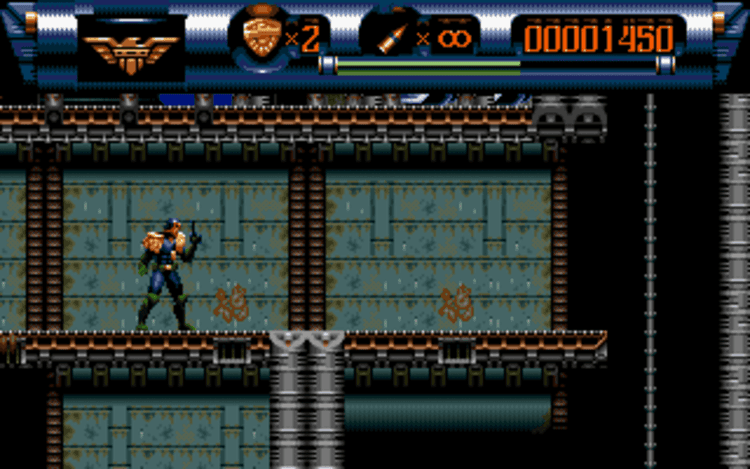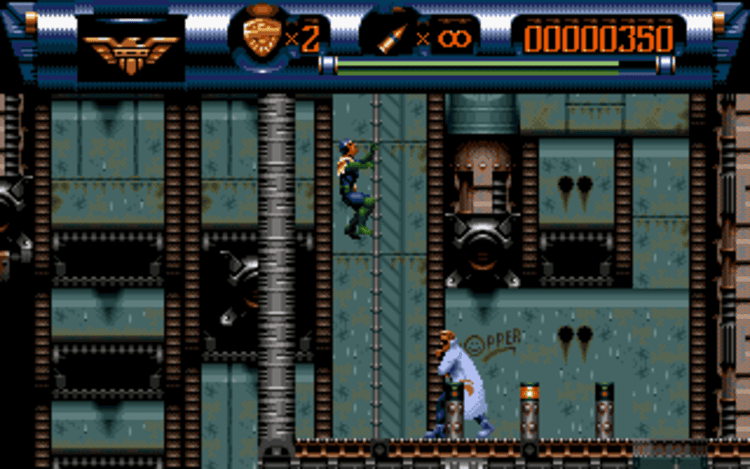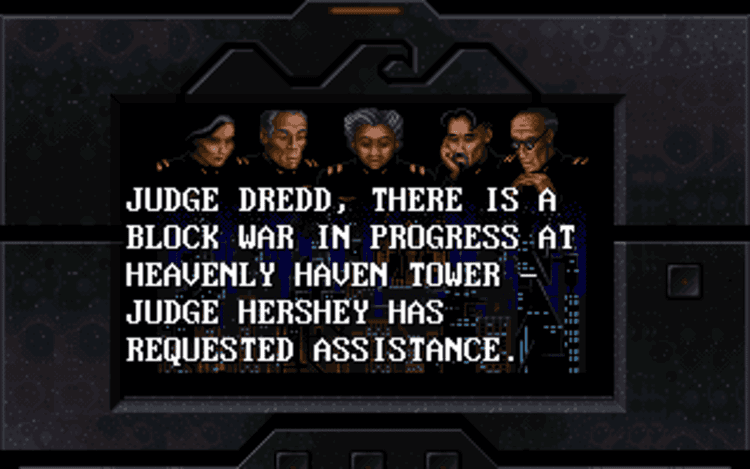
Judge Dredd is a classic DOS action-platform game that turns the comic’s ironclad Law into fast, side-scrolling justice. Published by Acclaim Entertainment and developed by Probe, it drops you into Mega-City One to track perps, swap gadgets, and deliver instant sentences. Crisp movement, vertical climbs, and varied weapons recall the punchy pacing of Contra, while the dystopian mood evokes the industrial bite of RoboCop. Levels push you to explore, rescue, and neutralize threats with measured aggression. Fans of retro action can play again and newcomers can enjoy timeless arcade challenge, tight controls, and bold comic-to-game style.
Judge Dredd lands on DOS as a brisk action-platform game that distills the comic’s harsh humor and zero-tolerance justice into quick, readable encounters. Published by Acclaim Entertainment and brought to computers with Probe’s taste for chunky explosions and responsive inputs, it lets you step into the boots of the most uncompromising lawman in Mega-City One. The premise is immediate and satisfying: move through layered industrial strongholds, pick the right ammo for the threat, and keep the streets quiet by any legal means necessary. It’s a compact, kinetic adaptation that favors momentum over bloat, and it holds up because clarity and tempo never go out of style.
Stage design mixes classic left-to-right sprints with vertical routes that open secret loops, elevators, ducts, and catwalks. Missions always frame a clean directive—shut down renegade tech, rescue hostages, collar a figurehead—but the path to completion typically branches. That structure turns each level into a miniature neighborhood of Mega-City One, where you weigh speed against safety and chart alternate lines when a corridor grows hot. Enemy telegraphs are readable, projectile speeds are fair, and the game rewards rhythm: a short climb, a precise jump, a quick swap to the right round, then a decisive push through a choke point. It is paced for replay, inviting you to improve routes and execution.
Weapons and tools reinforce the fantasy of lawful choice. Standard rounds handle street enforcers, but specialized ammunition and non-lethal options let you tailor outcomes. A gas or stun solution might spare civilians in cramped rooms, while a heavy-hitting load cracks armor on a looming brute. Because resources are finite, every trigger pull is a tiny decision: burn a rare shot to end a fight cleanly, or save it for an unknown gatekeeper deeper in the map. The result is a satisfying push-pull between aggression and restraint that feels faithful to Dredd’s judgment-first persona.
The presentation aims for legibility without sacrificing mood. Sprites are large enough to read stance and intent, environmental tiles communicate industrial decay, and hazard colors highlight danger without camouflaging platforms. Backgrounds sell a city that’s equal parts steel and grime, and small flourishes—sparks, signage, steam—add texture. Audio leans into metallic percussion and tight motifs, keeping the pressure high without drowning out cues. Shot effects and enemy grunts are punchy and purposeful, which helps timing. Bosses, meanwhile, are set pieces rather than sponges, each with a pattern that rewards observation and positioning. You’ll bait leaps, break line-of-sight, and time weapon swaps, turning climactic duels into neat tactical vignettes.
Movement has a grounded weight that suits deliberate platforming. Jumps commit just enough to demand intention, crouches and short drops let you manage your hitbox, and ladders plus ledges create opportunities for vertical feints. Firing cadence and recovery windows shape combat spacing: press too close and you’ll trade; hang back and attrition becomes the risk. The best moments feel like choreographed patrols, where micro-decisions stack: climb to a vantage, tag a turret with basic rounds, switch to non-lethal for a crowded room, then pivot to a power shot for a shielded lieutenant. Difficulty ramps sensibly, asking for mastery of the fundamentals rather than surprise cruelty.
If you want a frictionless return to Mega-City One, you can play Judge Dredd online in a modern browser. The game runs free, with no restrictions, so you can jump into action within moments and focus on timing, route choice, and clean execution. It works smoothly on desktop and on mobile devices, letting you patrol on a phone or tablet without compromise. Whether you’re chasing faster clears or simply reliving favorite encounters, online play keeps the spotlight on the game’s sharp pacing and satisfying combat loops.
Success comes from treating chaos like a sequence of solvable rooms. Scout entries and exits, tag the highest immediate threat, and pick ammo tailored to the next thirty seconds rather than the entire stage. Non-lethal tools are invaluable where collateral damage would risk hostages, while heavy rounds crack armored roadblocks that stall momentum. Vertical routes often prove safer but demand confident jumps; fast horizontal pushes are quicker yet risk attrition. Manage economy by preserving rare shots for genuine spikes, and don’t be afraid to retreat half a screen to reset spacing. As your knowledge grows, levels transform into satisfying sprints where thoughtful choices feel as impactful as quick reflexes.
Licensed games endure when they respect tone and build systems that stand on their own. Judge Dredd does both. The city is oppressive yet readable, the protagonist is severe but never sluggish, and the toolkit supports tactical judgment rather than mere brute force. Even beyond nostalgia, the design remains appealing because it values legibility, momentum, and meaningful trade-offs over spectacle for spectacle’s sake. There will always be joy in routes you can optimize, gadgets that matter, and boss patterns that reward practice. It’s the kind of action game you can revisit years later and still find clean lines and crisp challenges waiting.
Judge Dredd on DOS is a confident slice of run-and-gun platforming wrapped in dystopian character. It blends readable layouts with weapons that truly change how you play, and it escalates difficulty in ways that feel earned rather than arbitrary. Expect the classic retro setup: directional keys for movement, crouching, and ladders; a dedicated jump; a dedicated fire; and a key to cycle weapons or gadgets – achieve this with the arrow keys, control and surrounding keys. Many versions also accommodate a gamepad for comfort, though exact mapping varies by configuration. Learn the cadence, respect your ammo, and the Law will be on your side.
All used codes are publicly available and the game belongs to its original authors.
Share game
Share game




Share game